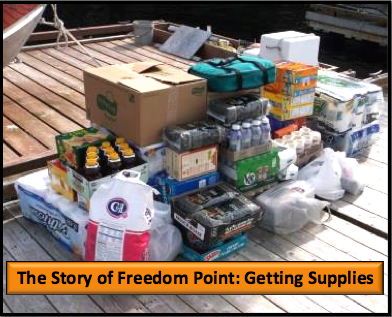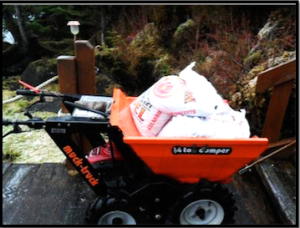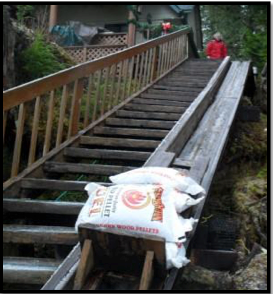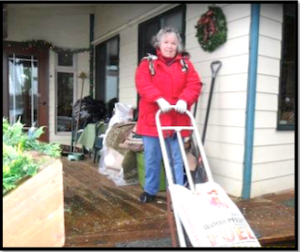
Living in Alaska brings special challenges when it comes to stocking your supplies. In the islands of the Southeastern part of the state, we rely on barges to bring in huge containers of food, medicine, and…everything! When you live out in the bush and off grid though, getting supplies to your home involves a lot more than unloading the car. For Mister Dreamer and I, we will do most of our major shopping twice a year and supplement every couple months as needed. Then there are people who take adapting and overcoming to the next level!
We take you back to Freedom Point where Ed and Linda P. share with us what they do to get supplies home.
Off grid living is very different for those who live on or near the road systems. Our situation requires boats, docks, and attention to tides. Ketchikan is the nearest town and our source for all supplies and, being an island, has a road system that dead ends on either end. We are located about 10 miles past the end of the road on the north end. The grid also stops at the same point, making the only way to access our location by boat. by float plane, or helicopter. We have been visited in the past by all three, but boat travel is the normal mode of transportation in our area. You just can’t get here any other way (and have it be easy and cost effective).
The forest that surrounds us is typical Alaskan rain forest. It’s not easily transited on foot and without some kind of trail or road, even four wheelers are of no use here. That makes the waters of Clover Passage and West Behm Canal our “road system.” We use a private marina to park our vehicles at the end of the road and have docking space for our boat there for use when we are in town. Everything we need has to be transported from the store to the vehicle, from the vehicle to the boat, from the boat to the house. Here’s some of the ways we accomplish this task.
First we have to accommodate the tide. Low tides mean steep ramps on both ends, so we try to pick our ventures into town to give us favorable ramps, especially on the coming home side of the trip. We handle the groceries and most freight from the vehicle into a two wheeled dock cart at the marina, down the ramp, then load it onto the boat (very often in the rain, as our annual rainfall here is about 160”).
 Then it all has to be moved from the boat onto a motorized wheel barrow called a “Muck Truck”, which we acquired after many years of a simple hand pushed wheel barrow. We off load the Muck Truck onto our power tram that uses an electric winch to pull up about 50 feet or so to the level of our house and then in it goes. We have found that by using large plastic tubs with a short rope tied to one end, we can easily drag, especially groceries along the wood walk to the back door and directly into the kitchen for putting away.
Then it all has to be moved from the boat onto a motorized wheel barrow called a “Muck Truck”, which we acquired after many years of a simple hand pushed wheel barrow. We off load the Muck Truck onto our power tram that uses an electric winch to pull up about 50 feet or so to the level of our house and then in it goes. We have found that by using large plastic tubs with a short rope tied to one end, we can easily drag, especially groceries along the wood walk to the back door and directly into the kitchen for putting away.
We use the Muck Truck for almost all freight, as well as the propane bottles used for cooking and heating our water. Between Linda and I, we have devised methods to haul pretty much everything without actually having to lift it. We even had to bring up a replacement fuel tank a couple years ago….Yep, the Muck Truck and tram did the job. We use wood pellets for our main source of heat and they come in 40 lb. bags. I can handle about ten bags per load on the boat. The dock cart and the Muck Truck carry five each trip….So two trips down and two trips up the ramps and we have about ten days of heat at one bag per day.
 When the tram is in operation, we have to run the generator to power the 1hp motor that powers the very low geared cable winch attached to a flat car on wheels that simply ride along the flat surface of the tramway. Works pretty well and we were smart enough to build this part of the system early on to use during construction. When we moved in, we carried most of our household goods, including a player piano up this tram, so it is a strong little beast and we cannot get along without it. (We were much younger, stronger and motivated then as well).
When the tram is in operation, we have to run the generator to power the 1hp motor that powers the very low geared cable winch attached to a flat car on wheels that simply ride along the flat surface of the tramway. Works pretty well and we were smart enough to build this part of the system early on to use during construction. When we moved in, we carried most of our household goods, including a player piano up this tram, so it is a strong little beast and we cannot get along without it. (We were much younger, stronger and motivated then as well).
As you can see, the transportation of supplies to a remote, off grid location presents with it many obstacles to overcome. Personally, I love the way they adapted and overcame with an eye toward the future. As they enjoy their retirement, Ed and Linda will still be able to handle the ‘heavy lifting’ with some good ol’ ingenuity and homestead skills.
 If you have questions for Ed or Linda about their unique lifestyle (or getting supplies), just ask in the comments below and one of them will answer!
If you have questions for Ed or Linda about their unique lifestyle (or getting supplies), just ask in the comments below and one of them will answer!



